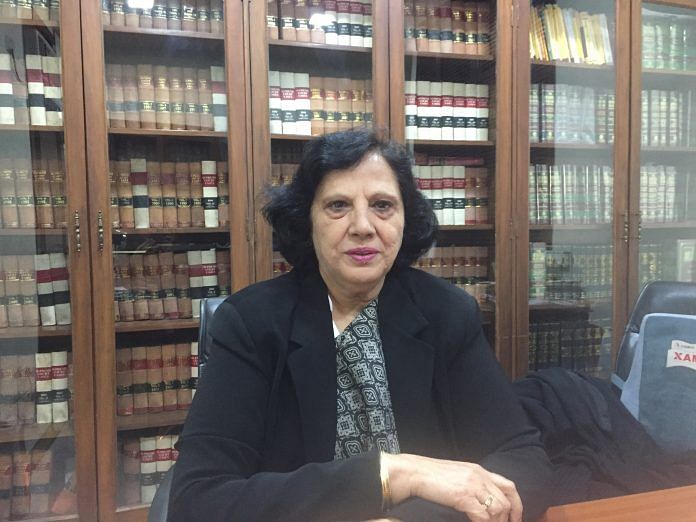Indra Sawhney, whose petition led to 50% cap on reservation, says upper-caste quota bill is unconstitutional & must be challenged in court.
New Delhi: Veteran lawyer Indra Sawhney, whose challenge to the then Prime Minister Narasimha Rao’s forward quota move in 1992 led to the 50 per cent cap on reservation, says she is shocked by the Modi government’s push for a 10 per cent quota to ‘economically weaker’ sections in the general category.
A day after a constitutional amendment to this effect was passed by the Rajya Sabha, Sawhney, 67, Thursday told ThePrint that the move sets the dangerous precedent of making India a reservation-dependent society.
“The bill violates the basic principles of the Constitution,” she said. “When reservation was brought, it was for 10 years, but now reservation has become a culture… We are moving towards a 100 per cent reservation-dependent society, it seems.”
Sawhney is synonymous with reservation politics in the country as it was in the landmark Indra Sawhney vs Union of India case, that a nine-judge bench of the Supreme Court decided to put a 50 per cent cap on reservations in the country, limiting quota for Backward Classes (27 per cent), Scheduled Castes (15 per cent), and Scheduled Tribes (8 per cent).
“At the time, I was a young lawyer, and one day I got very perturbed looking at children, college and school students protesting in (Delhi’s) Jhandewalan,” she said. “I was very moved, and therefore I decided to go to court.”
Sawhney, who has otherwise fought cases for the central government, Life Insurance Corporation (LIC), Food Corporation of India (FCI), among others, says the Mandal case was a “one-off case”.
“I think it was just destined that way,” she said.
Also read: 4 reasons why upper caste quota is being challenged in Supreme Court
‘People can submit fake income certificates’
Almost three decades later, Sawhney is not sure if she will herself challenge the Modi government’s move to expand the scope of reservation and extend it to economically weaker sections. But she is clear that the move should be challenged legally.
“It is not constitutionally permissible to make economic criterion the basis for reservation…The Supreme Court has said so clearly,” she said. “I’m not sure if I will challenge it but it will be challenged in court… It’s a bad idea.”
A petition, filed in the Supreme Court Thursday by a group called Youth for Equality and Dr. Kaushal Kant Mishra, said that the amendment violates the 50 per cent ceiling laid down by the court.
Moreover, Sawhney, still a practising lawyer, says the bill does not appear to be well thought through.
“I am not sure if they have collected enough data before bringing this amendment… How will they make sure that people do not submit fake income certificates? People do it all the time,” she said.
“It is the general category that will be affected adversely by this move,” she said. “Reservation should only be limited to SCs, STs and OBCs, and even for them, it should cease to benefit their children, if they have got the benefit once,” she added. “Otherwise, it will never end.”
Also read: Modi pushes upper caste quota ahead of lok Sabha polls, but where are the jobs?




Zara sochiye. In 1950, the Dalits and the Adivasis required the benefit of reservations, which the framers of the Constitution conferred on them for a decade. By 1989, the Other Backward Classes were found to be in need of special assistance, the 27% reserved for them exceeding the 15% and 7.5% set aside for SC and ST. In 2019, we now find that the general category, which is everyone else, also needs nurturing. What does that say about how development has spread in India, which the great and good will be showcasing to the world in Davos a few days from now.